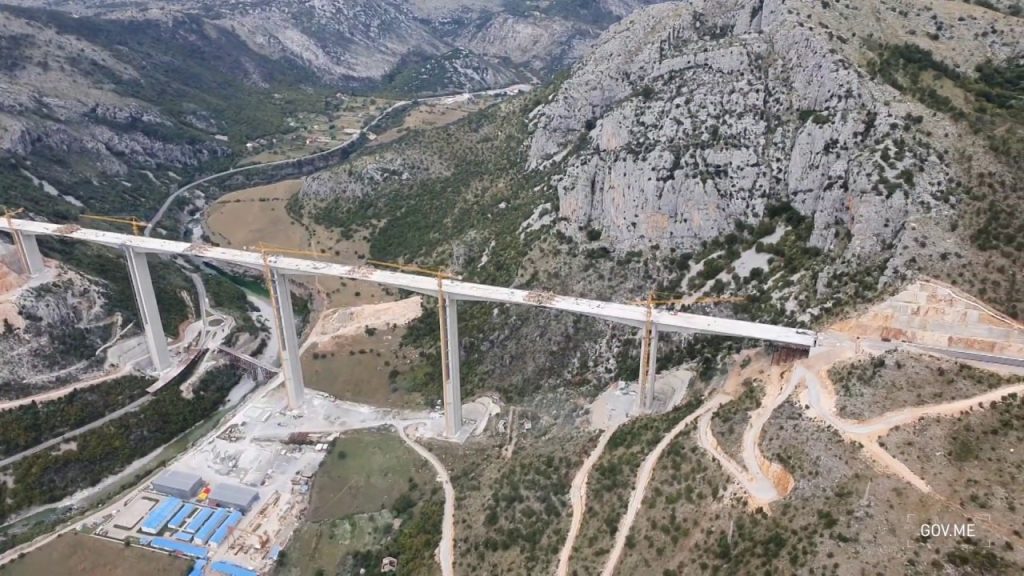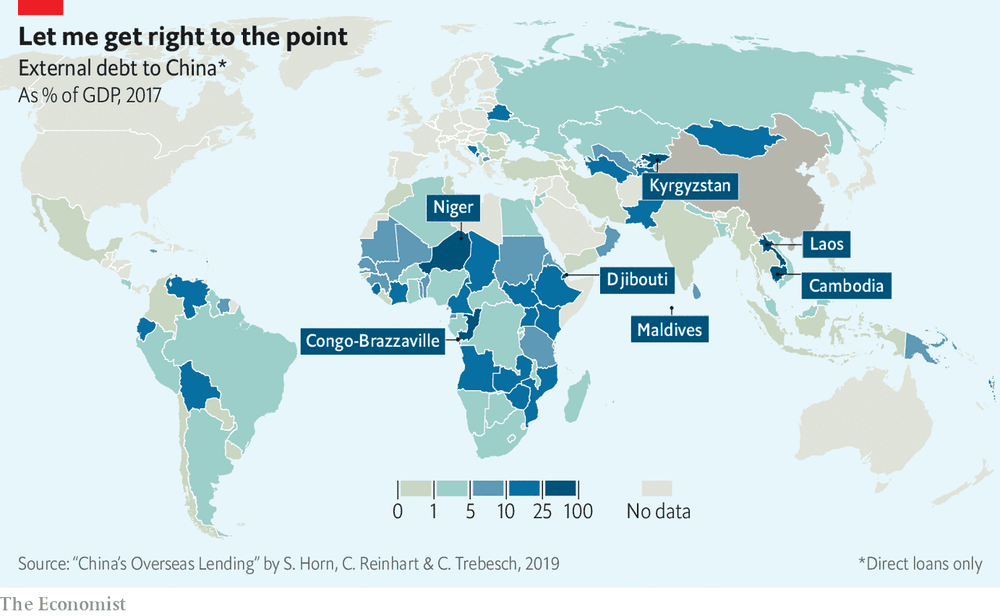It is evident that China is gradually increasing its economic and social influence and building infrastructure in Montenegro now in order to exert its influence on the country’s internal and foreign politics in the future.
Author: Milica Kovačević
In their recent report “Nations in Transit”, Freedom House writes that China exploits financially and infrastructurally weak countries to expand its influence abroad, including the debt-trap diplomacy strategy whereby economically stronger countries grant loans to developing countries, creating a debt burden along with political dependency.
According to some research, China has become the world’s biggest creditor in developing countries.
In the Western Balkans China stands ahead of the European Union (EU), which has more stringent conditions for loans and repayment of financial support. The outcome is that foreign debt in the Western Balkans region is more and more in the hands of China. According to the data provided by Freedom House, Montenegro and Northern Macedonia respectively owe 39 and 20 percent of the state’s debt to China.
China’s debt-trap diplomacy
Besides loans, investments from China are increasingly marked by the term “corrosive capital”. The phrase comes from the Center for International Private Entrepreneurship (CIPE), with the explanation that it refers to either private or state capital that lacks transparency, accountability and a market orientation, and which comes from authoritarian regimes to countries in transition.
The “corrosive capital” exploits and exacerbates existing weaknesses in governance to influence economic and political developments in the recipient countries.
Numerous studies have shown that China adjusts its investment strategy for each country, focusing on their weakest institution.
The non-transparent and non-market-oriented nature of these investments stimulates corruption and degrades transparency and the rule of law in recipient economies.
Since regaining independence in 2006, the inflow of foreign direct investments (FDIs) has served as an important generator of economic growth for Montenegro. In 2018, the gross inflow of FDIs to Montenegro amounted to 9% of GDP, which is high compared to other countries of the region.
Tourism, banking, energy and real estate are the sectors which receive most foreign investment. During this period Russia was the biggest direct investor in Montenegro, with $1,27 billion of cumulative investment.
Despite deteriorated bilateral relations, Russia is still among five leading investors in the country.
Significant investments have come from Western countries, as well as from the United Arab Emirates, Turkey, Azerbaijan and China, which is the focus of this article.
According to data published by the Central Bank of Montenegro in October 2020, China was the biggest investor in Montenegro in 2020, with 70 million Euros of direct foreign investment.
With the rise in public debt during the economic crisis that occurred after Montenegro re-gained independence, the country needed money for development and it had to look for it in the East. Western sources of financing had stringent crediting conditions which Montenegro found difficult to meet.
A motorway that leads to a debt trap
Despite numerous warnings and the fiscal unsustainability of the project, in 2014 the Government of Montenegro took a loan from the Chinese EXIM Bank for the construction of the Bar – Boljare Motorway. The road had been included for years in the country’s national plans for the integration of its transport network with those of neighboring countries and beyond, into European road corridors.
The 809 million Euro loan for the construction of the first section of the motorway led to a dramatic rise in Montenegro’s public debt.
From the very beginning the project was marked by a significant lack of transparency. Many documents relating to the planning and construction of the motorway were protected as secret, and even several years later the public did not get a complete picture of the project. Given the bilateral agreement between the two countries, and the credit arrangement being based on that agreement, any national regulations that would have increased control and transparency – including those related to public procurement – were bypassed.
After two extensions of the deadline it is expected that the first section of the motorway will be finished next year, when the first installment of the loan will have to be repaid.
Although the IMF has already warned that “the hasty completion of the motorway would probably jeopardize the fiscal sustainability of Montenegro”, the construction of the remaining three sections has entered a stage of uncertainty due to the crisis caused by the COVID-19 pandemic, which has seriously affected the Montenegrin economy.
In June 2020, the Montenegrin Government requested financial support from the IMF via the Raid Financing Instrument (RFI). It stated it would not undertake any further stages of construction of the Bar – Boljare Motorway, or any other capital expenditures that could jeopardize the sustainability of the debt, until the prospects for the public finances have significantly improved.

The first stage of the motorway, which is close to completion, is an impressive construction through the Montenegrin mountains – but it ends up in the middle of nowhere, and will not be able to create conditions for a return of the investment in the near future because it has not been connected to the regional network yet.
Meanwhile, meager resources that could be spent in more profitable ways are being wasted.
The main “corrosive effect” of the Chinese loan is that it blocks the autonomy of present and future Montenegrin governments because, financially, it ties the country’s hands for years to come.
Under the burden of high public debt, Montenegro has more and more difficulties finding money on the financial markets, and it has already taken on loans under unfavorable rates of interest from neighboring countries.
Montenegro’s public debt discourages prospective investors because a potential increase in taxes to finance the debt would be seen as an unnecessary business cost. The lack of inflow of investments and other revenues will make it more difficult for Montenegro to continue financing its reform projects. The combination of fiscal risks and management risks due to the growing dependency on China could also jeopardize Montenegro’s geo-strategic orientation and related democratic development.
Political and cultural cooperation
With a greater economic presence in Montenegro, China’s political presence has increased as well. Bilateral relations between the two countries are developing. Many agreements on cooperation in different areas have been signed, while the liberalization of visa policy is underway.
Exchange programs between Montenegro and China are well developed and include frequent visits by large groups, such as public administration and local government representatives, business associations, media, academic communities, teachers and students. The cooperation between the two countries in the field of education is continuously developing. All three universities in Montenegro have established partnerships with Chinese universities.
Every year, the best Montenegrin students receive scholarships to study in China. The Confucius Institute organizes classes of Chinese language across the country.
Analyses conducted by the Center for Democratic Transition (CDT) show that Montenegrin media report mostly positively on China.
Media reports mainly emphasize the importance of the Bar –Boljare Motorway project, Chinese donations to Montenegro, and the promotion of cooperation between China and Montenegro.
Many articles describe Chinese successes in science, arts, infrastructure and technology.
On the other hand, one rarely finds articles about the Chinese political system, the quality of life of its citizens, or social inequalities. The Chinese Embassy in Montenegro often organizes visits of Montenegrin journalists to China.
These often involve visits to Chinese companies, important project locations, historic and cultural monuments, and the media. Reports on such tours are usually one-sided and mostly positive because visitors are only offered the good sides of China.
The rise in Chinese economic and political presence in Montenegro (and the media reporting about it) influence the views of citizens, and in recent years polls have shown that the popularity of China competes increasingly with that of the European Union (and Russia), while other Western countries are greatly behind them.
Lessons (not) learned
When assessing Chinese influence in Montenegro we must bear in mind the long-term political, economic and even civilizational decisions that Montenegrin society will have to take.
A fragile democracy in a constant process of transition cannot strengthen the bodies of democratic self-regulation if it is under the economic and political influence of a society that is totalitarian and undemocratic in its essence.
It is evident that China has been gradually increasing its economic and social influence, and building infrastructure in Montenegro, to one day use it to exert its influence on the country’s internal and foreign politics.
All foreign investors in Montenegro have been treated as nationals, and there are no restrictions on the right to private ownership or the establishment of companies in Montenegro.
Furthermore, Montenegro currently does not have any mechanisms to control incoming foreign investments. Registration of an actual end proprietor has not been introduced yet, which leaves room for capital inflows that originate from hidden owners or illegal activities.
By signing international agreements, it is possible to bypass national legislation relating to public procurement, including its transparency. Investments into projects of strategic importance for the Montenegrin economy may thus evade necessary public scrutiny.
As a small country, Montenegro will always have exceptionally asymmetric economic relations with powerful economies. However, excessive dependency on the capital of any foreign state and concentrated primarily in key industries must be avoided.
Montenegro must be cautious when it evaluates its resources, particularly when it comes to investments in electric energy production – coal, hydro , wind and solar power plants. Despite the obviously great need for major development projects, the Government of Montenegro should not enable major countries like China to have cheap and aggressive access to its limited resources. Enabling their entrance into such key industries must be assessed from a perspective of national security and economic development.
Note:
This article is based on the results of research on Chinese economic influence in Montenegro conducted by the Podgorica-based Center for Democratic Transition (CDT), with the support of the Washington-based Center for International Private Entrepreneurship (CIPE).








